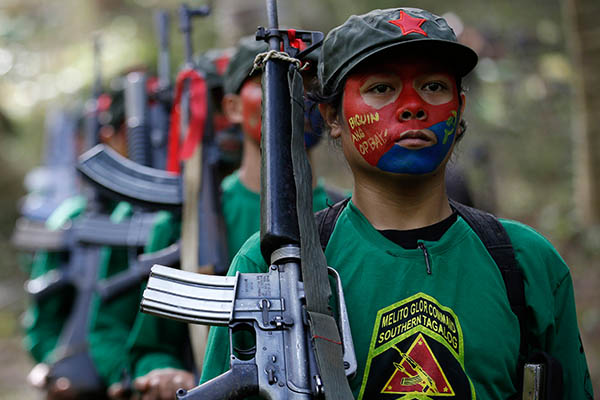
The Communist Party of the Philippines, during the celebration of the communist movement’s 49th anniversary, ordered its armed wing, the New People’s army, to intensify guerilla attacks on the entire archipelago next year while building “the broadest united front” to overthrow President Rodrigo Duterte. AP/Aaron Favila, File
Malacañang on Saturday slammed the Communist Party of the Philippines for setting the downfall of President Rodrigo Duterte as the Left’s goal for 2018 following the collapse of peace talks.
CPP, during the celebration of the communist movement’s 49th anniversary, ordered its armed wing, the New People’s army, to intensify guerilla attacks across the entire archipelago next year while building “the broadest united front” to overthrow Duterte.
Responding to the underground Left’s threat, Presidential Communications Secretary Martin Andanar slammed the CPP and said communist rebels just proved that they’re “enemies of the state” for planning to topple a duly-elected president.
Malacañang on Saturday slammed the Communist Party of the Philippines for setting the downfall of President Rodrigo Duterte as the Left’s goal for 2018 following the collapse of peace talks.
CPP, during the celebration of the communist movement’s 49th anniversary, ordered its armed wing, the New People’s army, to intensify guerilla attacks across the entire archipelago next year while building “the broadest united front” to overthrow Duterte.
Responding to the underground Left’s threat, Presidential Communications Secretary Martin Andanar slammed the CPP and said communist rebels just proved that they’re “enemies of the state” for planning to topple a duly-elected president.
“Kung gustong pabagsakin ng CPP-NPA-NDF ang ating Pangulo, pinapabagsak din nila ang gobyerno (If the CPP-NPA-NDF wants to oust our president, then they’re overthrowing the government as well),” Andanar told state-run DZRP radio.
“Ibig sabihin (It only means that) they are really enemies of the state and they are enemies of the people,” he added.
The communists have been waging a guerilla war for almost five decades in a bid to topple a “bureaucrat” capitalist system that has caused one of Asia’s widest rich-poor gaps despite the Philippines being rich in natural resources.
Communist fighters are known for collecting “revolutionary taxes” from local businesses in rural areas—an activity that authorities qualified as plain extortion. They are also recognized for their deadly attacks on police and military outposts.
In 2002, the US Department of State designated the CPP-NPA as foreign terrorist organizations.
Amid continued hostilities, Duterte, a self-styled socialist, unilaterally scrapped last month the reactivated peace talks between the government and Maoist rebels. Both sides have been in on-off negotiations since 1986.
He said peace talks were called off because of the Left’s “pure nonsense” demand for a coalition government, and the rebels’ supposed lack of sincerity.
He later declared the CPP and its armed-unit as terrorist groups, raising concerns among activists in the national democratic movement that legitimate organizations could be targeted as supporters of terrorism.
EXPLAINER: Why Duterte's 'red-baiting' of activists is dangerous
In their 49th anniversary message, the CPP warned of a "growing peasant movement" in the country under Duterte's rule, and urged its members to stage more demonstrations in 2018.
“We are looking forward to mark the Party’s 50th anniversary next year with even bigger and more momentous victories in the ideological, political and organizational fields,” they said.
“Ibig sabihin (It only means that) they are really enemies of the state and they are enemies of the people,” he added.
The communists have been waging a guerilla war for almost five decades in a bid to topple a “bureaucrat” capitalist system that has caused one of Asia’s widest rich-poor gaps despite the Philippines being rich in natural resources.
Communist fighters are known for collecting “revolutionary taxes” from local businesses in rural areas—an activity that authorities qualified as plain extortion. They are also recognized for their deadly attacks on police and military outposts.
In 2002, the US Department of State designated the CPP-NPA as foreign terrorist organizations.
Amid continued hostilities, Duterte, a self-styled socialist, unilaterally scrapped last month the reactivated peace talks between the government and Maoist rebels. Both sides have been in on-off negotiations since 1986.
He said peace talks were called off because of the Left’s “pure nonsense” demand for a coalition government, and the rebels’ supposed lack of sincerity.
He later declared the CPP and its armed-unit as terrorist groups, raising concerns among activists in the national democratic movement that legitimate organizations could be targeted as supporters of terrorism.
EXPLAINER: Why Duterte's 'red-baiting' of activists is dangerous
In their 49th anniversary message, the CPP warned of a "growing peasant movement" in the country under Duterte's rule, and urged its members to stage more demonstrations in 2018.
“We are looking forward to mark the Party’s 50th anniversary next year with even bigger and more momentous victories in the ideological, political and organizational fields,” they said.

No comments:
Post a Comment
Note: Only a member of this blog may post a comment.